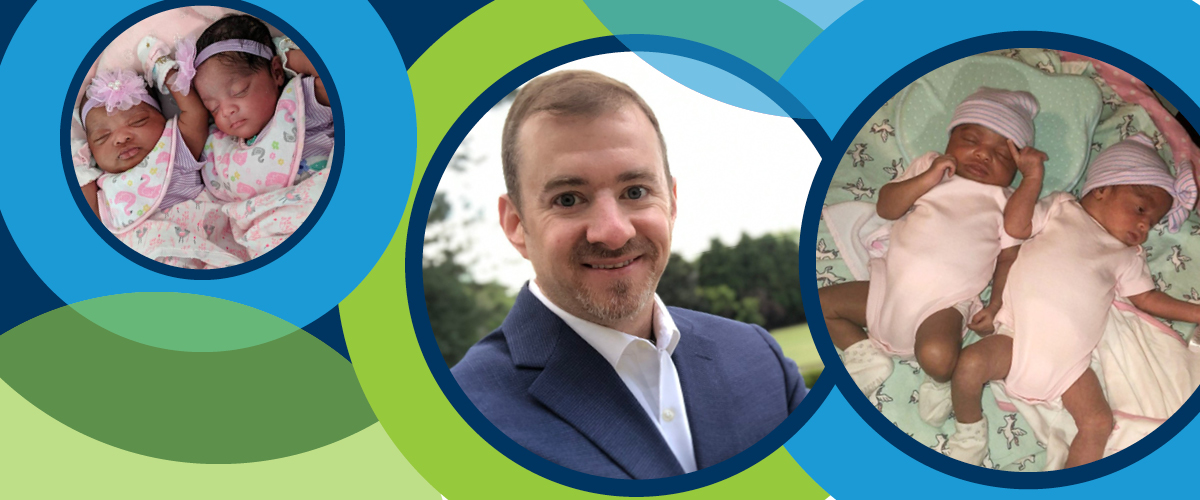When COVID-19 came upon us, it brought with it so many unknowns. For Pediatrix practices such as Piedmont Henry Hospital in metro Atlanta, our neonatology team partnered with hospital administration to begin preparing for pregnant COVID-positive patients, just in time for their first case: A mother expecting twins who presented with respiratory distress. When the doors of the Operating Room opened, the NICU team, led by J. Gibson Gray, DO was handed twins who had entered the world moments earlier, and the fight to bring them safely home began.
As the largest provider of Women’s and Children’s services, across multiple specialties, Pediatrix is uniquely positioned for enhanced collaboration. In late March, that collaboration was critical for Monique Cook, who was 33 weeks, six days pregnant, and showing possible signs of the virus. Without a full understanding of how the virus was transmitted, clinicians needed to take every precaution, and pre-planning was critical for the safety of mothers, babies, and the health care providers themselves.
Cook never suspected she had been exposed to COVID-19, but the clinical care team followed all protocols and treated her as a Person Under Investigation (PUI). They administered a rapid COVID test, and within 12 hours, confirmed this expectant mother was, in fact, COVID positive. By that time, she had already given birth to two baby girls.
Clinical teams under pressure
The doctors caring for Monique Cook decided a C-Section would be the best option to quickly make room for her lungs to inhale an adequate oxygen supply. In the post-COVID-19 world, new protocols were required across all of health care. For C-Section, a patient would first be intubated in a negative pressure room, then transferred to an operating room for the C-Section delivery.
Dr. Gray and his team were on standby outside of the intubation room, wearing appropriate personal protective equipment (PPE). During the intubation, the mother’s health began to deteriorate rapidly, and an emergency C-Section was necessary.
Caring for patients in unprecedented circumstances
To protect the babies from contracting COVID, they were immediately separated from their mother. After a quick assessment, the medical team discovered baby A was doing fine. However, baby B was showing signs of apnea. She would require intubation and both babies could potentially become neonatal COVID patients.
At the time, there was only one known case of a baby who had contracted the virus, and it was in the UK. With limited information on how COVID was affecting babies, Dr. Gray and his team had no idea what to expect. “One of our biggest challenges was processing information overload, and the constantly changing protocols,” he said. During the investigation period, the care team treated the twin girls as if they were COVID positive. Thankfully, after nasal and oral swabs at 24 and 48 hours, the babies’ COVID test results came back negative. Once the COVID status of the babies was confirmed, the next step was how to best care for the whole family.
A matter of family
After her emergency C-Section, Cook was struggling to survive. Through collaboration within the Piedmont Healthcare System, she was transferred to Piedmont Atlanta Hospital and placed on an ECMO machine, which is a form of life support to help her heart and lungs function. Dr. Gray worked with the hospital and infection control team to ensure the father was allowed to visit the twins in the NICU when appropriate. Within a few weeks, after an uneventful hospital course, the babies became strong enough to head home.
Their mother had a much harder road to recovery; it was another eleven days before she was discharged, plus an additional 14 days of quarantine away from her family. “A challenging aspect of caring for patients and families through this crisis is that its hardest on the patient who is restricted from having any support of family or friends with them,” said Dr. Gray
As it presented early in the COVID-19 pandemic, this case helped clearly define and fine tune protocols in the Piedmont Healthcare system to reduce the risk of exposure and complications of COVID significantly. Weekly COVID webinars presented by Pediatrix leaders were a valuable source of information during this early pandemic period.
The AAP has published guidelines, which align with the approach Dr. Gray and his team took to care for these babies. “We rely on our practices to have a coordinated approach with hospitals and local community resources,” said Scott Johnson, Medical Director of the Neonatology Practice and NICU Medical Director at Piedmont Atlanta Hospital. “It was a testament to the partnership of our teams and Piedmont Healthcare, that on the day of this delivery, the Chief Medical Officer, Chief Nursing Officer, CEO, and our Pediatrix team members were all present and ready for this delivery. They acted with a clear understanding of how to take great care of this family and how they would best care for those who would follow.”
Subscribe to the MEDNAX Blog to receive more information about recent news, recognitions clinical outcomes, lessons learned, and best practices.
